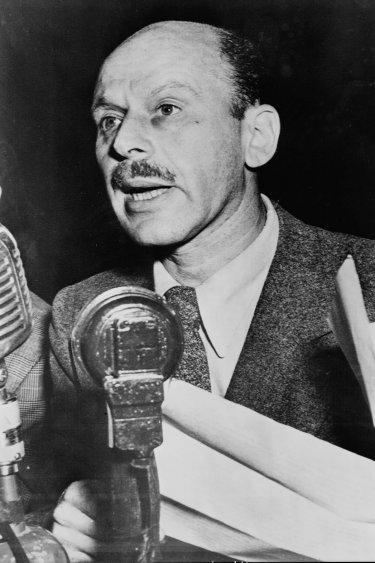Alvah Bessie (Alvah Cecil Bessie)

Alvah Bessie became initially known for his translations of avant-garde French literature, including Songs of Bilitis by Pierre Louÿs and The Torture Garden by Octave Mirbeau. During the 1930s, Bessie became alarmed at the rise of fascism, and began working for the anti-fascist cause. No stranger to soldiering, through 1938 Bessie fought as a volunteer in the Abraham Lincoln Brigade of the International Brigades during the Spanish Civil War. Upon his return, he wrote a book about his experiences, Men in Battle. Alvah Bessie then joined the American Communist Party and worked as the film reviewer for the left-wing magazine The New Masses. Bessie wrote screenplays for Warner Brothers and other studios during the mid and late 1940s. He was nominated for an Academy Awardfor Best Original Story for the patriotic Warner’s film Objective Burma (1945). His career came to a halt in 1947, when he was summoned before the House Un-American Activities Committee (HUAC). He refused to deny or confirm involvement in the Communist Party USA, and in 1950, he became one of the Hollywood Ten when he was imprisoned and blacklisted. After his release from prison, he worked at the hungry i nightclub in San Francisco, running the lights and sound board and frequently introducing performers. Bessie left the Communist Party in the 1950s.
In 1957, Alvah Bessie wrote a novel fictionalising his experiences with the HUAC, The Un-Americans. He followed this with a non-fiction account of his confrontation with the same organisation, Inquisition in Eden, in which he boasted of inserting pro-Soviet propaganda that was “subversive as all hell” into the film Action in the North Atlantic. Bessie’s greatest commercial and critical success came with the satirical novel The Symbol, about the exploitation by the film industry of an unhappy actress who resembles Marilyn Monroe. He wrote another non-fiction book in 1975, Spain Again, which chronicled his experiences as a co-writer and actor in a Spanish movie of the same name (Spain Again, 1969). His screenwriting career was ruined by the blacklisting, and he never returned to Hollywood. Late in his life, however, he was involved in bringing his novel Bread and a Stone to the screen in the feature film “Hard Traveling” (1986) starring J.E. Freeman and Ellen Geer. The screenplay for the film was written by one of Alvah’s two sons, Dan Bessie, who has also spent his career working in the film industry. Dan Bessie has published some of his father’s previously unpublished or uncollected works, notably his Spanish Civil War Notebooks(2001). In his family biography Rare Birds: An American Family (University Press of Kentucky, 2001), Dan Bessie notes that Alvah was related to some highly successful entrepreneurs: he was father-in-law of well-known 1960s poster artist Wes Wilson, husband of Alvah’s daughter Eva, and a brother-in-law (through his first wife, Mary) of famous advertising executive Leo Burnett. Alvah Bessie died in Terra Linda, California, aged 81.
Born
- June, 04, 1904
- USA
- New York, New York
Died
- July, 21, 1985
- USA
- Terra Linda, California
Cause of Death
- heart attack
Other
- body donated to medical science

